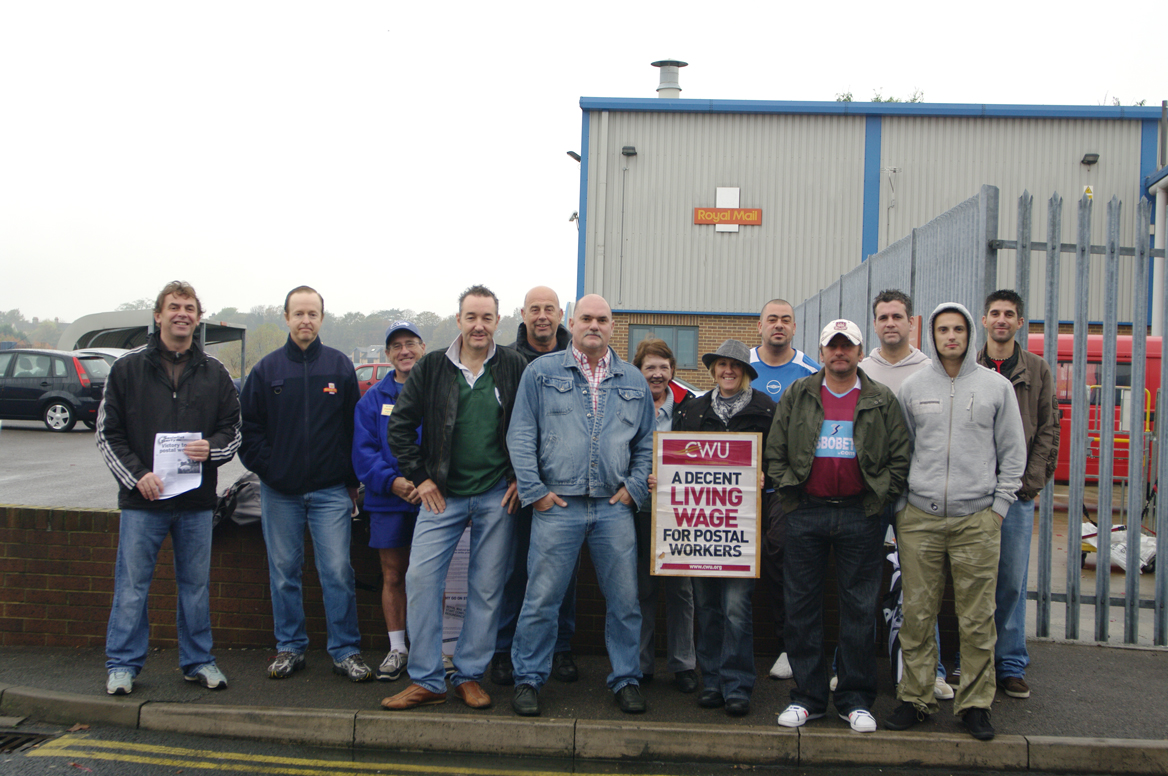The roots of this dispute and the reasons for these strikes go all the way back to 2002 and the appointment of Allan Leighton and Adam Crozier as chairman and chief executive of Royal Mail. Since they took over, there have been 60,000 job losses. Or cuts to you and me. So the people who are left are working harder and harder. ‘Modernisation’ simply means cuts.
A Coventry postal worker
The second post was scrapped. So Royal Mail had to find other work for its delivery staff. It made redundant those people who sorted mail on the day shift for delivery the following day and got us to do it after finishing the first post. This was then changed to having us do the work in the morning, sorting that day’s mail. And so began the later deliveries.
A feature of this management’s cost-cutting policy was the constant removal of rounds from offices. Year on year, rounds have been getting larger, so as to make them 3½ hours long. And last week my manager told us Royal Mail want us to be on the streets for at least 4½ hours.
Then in 2007 the government announced it was seeking a ‘strategic partner’, confirming what everyone suspected. That costs were being reduced to make Royal Mail attractive for privatisation. We staff were even given ‘shares’ in the company. Even though Royal Mail is state owned! I now ‘own’ shares in Royal Mail, even though you and I (the public) own the company.
I call it a company because the public service ethos has been stripped out. Most staff still strive to maintain that but it is now a public service run by people with no experience of the business, only OF business. So it is run as if it was a private company.
Royal Mail is a bulk mail carrier and no other operator is able to deliver the amount of mail we do to the number of addresses we do – 28 million. When politicians and Royal Mail say that customers will leave Royal Mail they mean parcel senders. But parcels are a tiny fraction of our postbags.
Bulk mail
The bulk of our work is delivering catalogues, magazines and what most people regard as junk mail, in addition to mail from utility companies, banks, and of course the government. Some of these companies may now choose to have their mail sorted and processed by other operators like TNT or DHL, but Royal Mail then delivers it.
These companies, the Down Stream Access companies (DSAs) are now Royal Mail’s customers, along with the bulk mailers. Not you and I, the people who buy stamps to send letters or bill payments. So when they talk about disrupting customers they don’t mean you. This is not a public service any more.
Broken agreement
The current dispute is a direct result of Royal Mail’s refusal to keep to the agreement made with the union in 2007. Once Royal Mail got what they wanted – job losses, cuts and imposed changes to working conditions, they walked away.
As part of that agreement, in October last year our delivery rounds got bigger. We accepted that. In April this year Royal Mail announced a profit of £321 million – during a global recession. They then announced a pay freeze and we reluctantly accepted this.
The same month, night sorting on each area ceased in Coventry and we on deliveries now do this work, sorting perhaps 50% of the mail we deliver.
Machines sort perhaps 80 to 90% of all letters but we sort everything else before getting our rounds ready and being allowed out of the door at 9.30am. And we do this for no extra pay. More work + pay freeze = pay cut. And deliveries get later.
There are so many issues affecting 120,000 post workers in many different roles but I hope this will help to explain our anger at the way we are treated.








